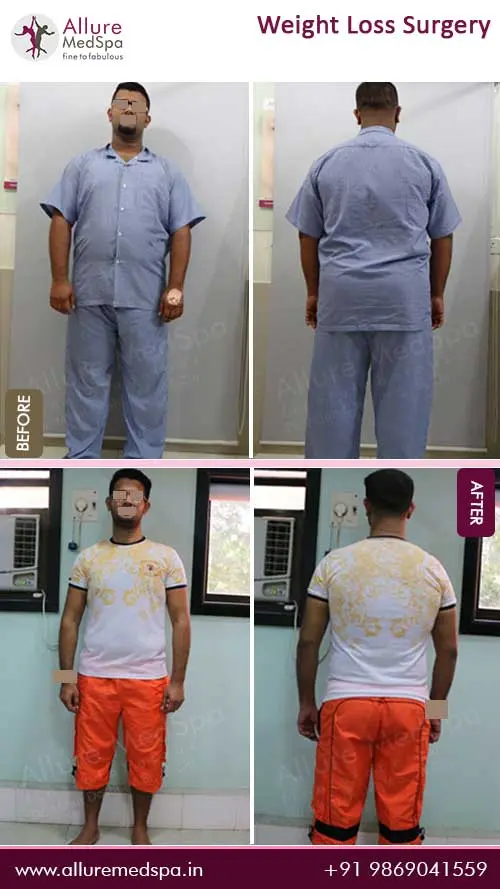Bariatric Surgery in Mumbai: Safe, Effective Weight Loss for Life
Lose Weight, Gain Health — Redefine Your Life with Bariatric Surgery
- Do you want to achieve long-term weight loss success and dramatically improve your overall health and lifestyle?
- Are you struggling with morbid obesity, low energy, or obesity-related health issues like diabetes, high blood pressure, or sleep apnea?
- Have diet and exercise failed you repeatedly—and now you’re ready for a life-changing, doctor-guided solution?
Living with severe obesity can feel overwhelming—not just physically, but mentally and emotionally. Daily routines, relationships, and even self-worth can suffer when your body doesn’t support the life you want to live. It’s not just about losing weight—it’s about gaining back control, confidence, and vitality.
Bariatric Surgery offers an effective, medically-backed solution for sustainable weight loss and better health. Through procedures like gastric bypass, sleeve gastrectomy, or mini gastric bypass, bariatric surgery modifies your digestive system to reduce hunger, improve metabolism, and help you achieve and maintain a healthier body weight—often for life.
Global & Indian Trends:
- Bariatric surgery volume has doubled from 10,000 to 20,000+ cases annually in India in just five years
- 75–80% of weight loss is maintained long term in most patients post-surgery
- Increasing acceptance of metabolic surgery for treating uncontrolled diabetes and high cholesterol
Source: ISAPS Global Survey 2023
Let’s explore how bariatric surgery works, who it’s for, and why it could be the safest, smartest investment in your future.
Related Links: Liposuction Surgery| Tummy Tuck Surgery | Body Lift Surgery
What Is Bariatric Surgery?
Bariatric Surgery is a group of surgical procedures aimed at achieving significant and sustainable weight loss by altering the digestive system. It helps treat obesity and related medical conditions like type 2 diabetes, high blood pressure, and heart disease.
Common types of bariatric surgery include:
- Sleeve Gastrectomy: Reduces stomach size, leading to reduced food intake
- Mini-Gastric Bypass: Alters stomach and intestine structure to change absorption and hormone levels
- Laparoscopic Gastric Banding: Places an adjustable band around the stomach
Bariatric surgery also improves fat metabolism, insulin resistance, and overall energy balance—offering both physical transformation and medical improvement.
Patients must meet certain criteria, including:
- BMI > 40, or BMI > 35 with comorbidities like diabetes or sleep apnea
- Failed previous non-surgical weight loss attempts
- Age between 18 and 65 years
Dr. Milan Doshi, an expert in advanced laparoscopic bariatric techniques, has helped hundreds of patients regain health, energy, and confidence through personalized surgical care at Allure Medspa, Mumbai.
Synonyms for Weight Loss Surgery:
Bariatric Surgery, Obesity Surgery, Weight Reduction Surgery, Gastric Surgery, Laparoscopic Weight Loss Surgery, Stomach Surgery, Bariatric Procedure, Gastric Bypass, Sleeve Gastrectomy, Metabolic Surgery
Tried Everything and Still Can’t Lose Weight?
Bariatric Surgery Before and After Images
Seeing real results but unsure if they’re possible for you?
Bariatric SurgerySurgery Testimonials: Fine To Fabulous Journeys
Awarded by Google.com
Rating: 4.7
Reviews: 485+
Awarded by WhatClinic.com
Rating: 4.8
Reviews: 119+
Awarded by Realself
Rating: 4.9
Reviews:453+
Awarded by Facebook
Rating: 4.6
Reviews:105+
Dr Milan Doshi and his staff are very professional and committed as the centre is highly equipped with advanced technology. I had closed rhinoplasty 4 months back and I’m seeing the results as to how it becomes successful.
Deepika Shetty
The doctor explained everything clearly and the surgery was smooth. Recovery was faster than I expected and the team was very supportive.
Rahul Mehta
Very natural results and excellent staff. From consultation to follow-up, the experience was outstanding and boosted my confidence.
Sneha Kapoor
See how moms just like you went from hiding to shining — your journey starts here.
What Are the Quick Facts About Bariatric Surgery?
| Time Required | 2–3 Hours |
| Anesthesia | General anesthesia |
| Pain Level | Mild to Moderate |
| Hospital Stay | 1–2 Days |
| Flyback | 5–7 Days |
| Success Rate | Very High |
| Result | Immediate. Major difference, 6-8 monthsfor Final result |
| Diet | Liquid diet for a week |
| Success | More Than 97% |
| Complication | Less Than 1–2% |
| Cost | ₹2,00,000 – ₹3,50,000 |
Still unsure about the procedure? Get personalized guidance from Mumbai’s top cosmetic surgeon.
What is Overweight, Obesity & Morbid Obesity?
Overweight, obesity, and morbid obesity are classified by Body Mass Index (BMI). As BMI increases, health risks also increase significantly.
BMI Classification Chart
| BMI | Classification | Health Risk |
|---|---|---|
| Under 18.5 | Underweight | Minimal |
| 18.5 – 24.9 | Normal Weight | Minimal |
| 25 – 29.9 | Overweight | Increased |
| 30 – 34.9 | Obese (Class 1) | High |
| 35 – 39.9 | Severely Obese (Class 2) | Very High |
| 40 and over | Morbidly Obese (Class 3) | Extremely High |
Definitions
- Overweight: BMI between 25 and 29.9; indicates increased health risks and early fat accumulation.
- Obesity: BMI of 30 or above; indicates high body fat and higher risk of health problems.
- Morbid Obesity: BMI of 35 or more (Class 2 & 3); a chronic disease with serious co-morbidities and resistance to diet/exercise alone.
CDC Obesity Classes
- Class 1: BMI 30–34.9
- Class 2: BMI 35–39.9
- Class 3: BMI 40 or above — also termed as morbid obesity
Note: Morbid obesity is often linked with chronic illnesses like diabetes, heart disease, and joint disorders. Early intervention is crucial.
“Confused about your BMI? Let’s find out now.”
What Are the Causes and Health Hazards of Obesity?
Obesity is a complex condition influenced by multiple factors—biological, behavioral, and environmental. It not only affects your physical appearance but also contributes to several health complications.
Major Causes of Obesity:
- Excessive Food Intake: Regular consumption of high-calorie, low-nutrient foods contributes to fat accumulation.
- Lack of Physical Activity: Sedentary lifestyle or minimal physical exercise slows metabolism and increases fat storage.
- Genetic Susceptibility: Family history can increase one’s tendency to gain weight.
- Hormonal or Endocrine Disorders: Conditions like hypothyroidism and PCOS can lead to weight gain.
Health Hazards Caused by Obesity:
Physical/Physiological Risks:
- High blood pressure (Hypertension)
- Heart disease and stroke
- Type 2 Diabetes
- Gallbladder disease and gallstones
- Increased risk of cancers (breast, uterine, colon)
- Sleep apnea and breathing problems
- Digestive issues including GERD
- Infertility and pregnancy complications
- Urinary incontinence
- Osteoarthritis and joint pain
Psychological and Social Impacts:
- Low self-confidence and poor body image
- Social isolation
- Depression and anxiety
Other Functional Consequences:
- Difficulty in walking or performing routine activities
- Increased fatigue during daily tasks
- Shortness of breath with minimal exertion
- Challenges in maintaining personal hygiene
Conclusion: Understanding the multifaceted causes and health risks of obesity helps in adopting a holistic treatment approach. Early intervention can prevent long-term complications and improve quality of life.
“Worried about obesity risks? Let’s discuss solutions.”
What Are the Treatments of Obesity?
The treatment of obesity includes both non-surgical and surgical methods, depending on the severity, cause, and individual health condition. A comprehensive and personalized approach yields the best long-term results.
Non-Surgical Treatment Options:
- Diet Management: A well-balanced, nutrient-rich diet under the guidance of a dietician helps reduce excess weight safely.
- Eliminate sugary beverages like soda and carbonated drinks
- Cut down on saturated fats; opt for healthy unsaturated fats and nuts
- Choose whole foods over processed ones
- Avoid white bread, sugar, refined carbs
- Eat meals at optimal metabolic hours (7 AM, 12 PM, and 7 PM)
- Regular Exercise: Physical activity such as brisk walking, running, aerobics, or yoga boosts metabolism, burns fat, and builds muscle. It also improves heart health and stamina.
- Lifestyle Changes: Small shifts in habits—like reducing screen time, managing stress, meditating regularly, and improving sleep patterns—can prevent further weight gain and support weight loss.
- Treatment of Underlying Medical Conditions: Conditions like PCOS, hypothyroidism, or side effects from medications should be medically evaluated and managed to address the root cause of weight gain.
Surgical Treatment Options (Bariatric Surgery):
For individuals with morbid obesity (BMI ≥ 40 or BMI ≥ 35 with comorbidities), weight loss surgery may be advised. These surgeries alter the digestive system to help reduce food intake and nutrient absorption.
- Intragastric Balloon: A saline-filled balloon is placed in the stomach to limit food intake.
- Gastric Banding: A band is placed around the upper part of the stomach to restrict food consumption.
- Sleeve Gastrectomy: A portion of the stomach is removed to reduce appetite and caloric intake.
- Mini Gastric Bypass: A simplified version of gastric bypass surgery for effective weight loss.
- Roux-en-Y Gastric Bypass: A widely used surgery that reroutes digestion and restricts absorption.
- Other Novel Procedures: Newer technologies are being developed to offer minimally invasive solutions.
Post-Weight Loss Cosmetic Procedures:
After significant weight loss, many patients opt for cosmetic procedures to tighten loose skin and improve body shape:
- Body Lift – To remove excess skin and reshape the lower body
- Brachioplasty – Arm lift to tone and contour upper arms
Conclusion: A multidisciplinary approach—combining diet, activity, behavioral change, medical treatment, and surgical interventions—offers the best path for safe and sustained weight loss.
“Ready to explore the safest weight loss options for you?”
What Are the Benefits of Bariatric Surgery?
Bariatric surgery offers numerous health and quality-of-life benefits beyond just weight loss. It’s a proven treatment for patients with morbid obesity and related health complications. The key advantages include:
- Significant Weight Loss: Helps patients lose 50–70% of excess weight, which is often unachievable through diet and exercise alone.
- Long-Term Remission of Type 2 Diabetes: Many patients experience normalized blood sugar levels and reduced or eliminated need for diabetes medication.
- Improved Cardiovascular Health: Reduces risks of heart disease, high blood pressure, and stroke.
- Eliminates Obstructive Sleep Apnea: Most patients no longer require CPAP machines after surgery.
- Joint Pain Relief and Improved Mobility: Less stress on joints improves movement, reduces arthritis pain, and enhances physical activity.
- Improved Fertility: Hormonal balance and weight reduction increase the chances of conception, especially in women with PCOS.
- Alleviates Other Obesity-Related Conditions: Including GERD, fatty liver disease, asthma, and urinary incontinence.
- Relief from Depression: Enhanced self-image and physical ability often lead to a significant boost in mental health.
- Boost in Self-Esteem and Quality of Life: Many patients report improved body confidence, social participation, and overall happiness.
“Ready to achieve sustainable weight loss and better health?”
Am I the Right Candidate for Bariatric Surgery?
Bariatric surgery is not for everyone—it is specifically recommended for individuals who meet medical criteria and are emotionally prepared for lifestyle changes. You may be a suitable candidate if:
- You are struggling with long-term obesity and failed to achieve sustained weight loss through diet and exercise.
- You have a BMI ≥ 40 (or are over 100 pounds overweight).
- You have a BMI ≥ 35 with at least one serious obesity-related condition such as:
- Type 2 diabetes (T2DM)
- High blood pressure (hypertension)
- Sleep apnea or other respiratory disorders
- You are emotionally fit and committed to understanding post-surgery recovery, follow-ups, and lifestyle changes.
- You are not currently pregnant and free of severe psychiatric or addiction issues.
This surgery is a long-term commitment and works best when combined with lifestyle changes, dietary monitoring, and emotional support. Consultation with a qualified bariatric surgeon is essential to determine your eligibility.
“Think you’re a candidate? Let’s confirm today.”
What Are the Different Types of Bariatric Surgery?
Bariatric surgery includes different types such as Sleeve Gastrectomy, Mini Gastric Bypass, Roux-en-Y Gastric Bypass, and Gastric Banding—each with unique benefits.
- Sleeve Gastrectomy: Removes 75–80% of the stomach to reduce food intake and hunger hormones.
- Mini Gastric Bypass: Creates a smaller stomach pouch and reroutes the small intestine (also known as One Anastomosis Gastric Bypass).
- Roux-en-Y Gastric Bypass: Combines restriction and malabsorption by bypassing part of the stomach and small intestine.
- Laparoscopic Gastric Banding: A reversible procedure where an adjustable band limits the stomach’s capacity.
Each procedure is chosen based on your BMI, comorbidities, and health goals. An expert bariatric surgeon like Dr. Milan Doshi at Allure Medspa can help you determine the right option.
“Gastric sleeve, bypass, or balloon? Let’s choose wisely.”
What Should I Expect During a Bariatric Surgery Consultation?
During your bariatric surgery consultation, your surgeon will assess your medical history, lifestyle, and weight goals to create a tailored treatment plan.
- Discuss your weight gain/loss history and failed weight loss attempts.
- Review your lifestyle—diet, exercise, and habits like smoking or alcohol use.
- Share details of current medications, supplements, allergies, and past surgeries.
- Doctor evaluates your BMI, co-morbid conditions (diabetes, sleep apnea, etc.), and nutritional status.
- You’ll explore surgery types (gastric balloon, sleeve, bypass) best suited for your goals.
- Doctor explains risks, benefits, expected results, and recovery process.
- Bring reference photos and a list of questions to help personalize your care.
Overview of Bariatric Surgery Options Discussed in Consultation
- Gastric Balloon: Non-surgical option for BMI 30–35. Temporary. Helps reduce portion size. Mild side effects like nausea possible.
- Lap Band Surgery: Minimally invasive. Adjustable and reversible. Suitable for BMI ≥40 or ≥30 with comorbidities.
- Sleeve Gastrectomy: 75–80% of stomach removed. Permanent. Ideal for BMI ≥40. Promotes early satiety.
- Mini Gastric Bypass: Combines restriction + malabsorption. Effective for obesity-related health issues. Fewer incisions, reversible.
- Roux-en-Y Gastric Bypass: Gold standard for severe obesity. Permanent. Limits food intake and calorie absorption. Requires lifelong follow-up.
Each option is discussed based on your BMI, lifestyle, health conditions, and readiness. Your surgeon at Allure Medspa will guide you to the safest and most effective solution.
“Ready to book your consultation with the expert?”
What Results Can You Expect After Bariatric Surgery?
Most patients lose 60–80% of excess weight within 12 months after bariatric surgery—especially when combined with a healthy lifestyle.
- Initial weight loss of 30–50% of excess weight occurs in the first 6 months.
- Significant weight loss—60% to 80%—is achieved within 12 months post-surgery.
- Results vary depending on the type of surgery and patient’s commitment to lifestyle changes.
- Better outcomes are seen in patients who adopt:
– Healthy, balanced eating habits
– Regular physical activity
– Long-term portion control and reduced fatty food intake - Improved overall health, energy levels, and confidence are additional benefits.
With ongoing lifestyle support and follow-ups, bariatric surgery can offer life-changing, long-term weight management results.
“Excited for your transformation? Let’s plan it now.”
How Long Does It Take to Recover from Bariatric Surgery?
Recovery after bariatric surgery typically takes 2–3 weeks, with most patients resuming light activities within 7–14 days and full recovery in 4–6 weeks.
- Initial Downtime: 2–3 weeks of limited activity post-surgery.
- Work Resumption: Desk jobs can resume in 1–2 weeks; avoid heavy lifting or strenuous activity for 1–2 months.
- For Outstation/International Patients: Arrive in Mumbai 1–2 days before surgery and stay a minimum of 7 days post-op for follow-up and healing.
- Exercise Restrictions: No intense workouts for the first 4–8 weeks—always follow your surgeon’s advice.
- Recovery Support: Follow dietary guidance, take prescribed supplements, and attend follow-up visits for optimal healing.
With proper post-op care and lifestyle adjustments, patients usually recover smoothly and enjoy long-term weight loss success.
“Want a smooth recovery with expert care?”
What Are the Limitations of Bariatric Surgery?
While bariatric surgery is a life-changing procedure for many, it’s not suitable for everyone. Certain medical and lifestyle conditions may prevent individuals from being good candidates. The key limitations include:
- Inflammatory Bowel Diseases: Conditions like Crohn’s disease can interfere with digestion and healing post-surgery.
- Severe Heart, Lung, or Liver Conditions: These may increase surgical risks and affect recovery.
- Autoimmune Disorders: Diseases such as scleroderma or systemic lupus erythematosus can complicate post-operative outcomes.
- Substance Abuse Issues: Ongoing alcohol or drug addiction is a contraindication due to poor compliance and increased risk of complications.
- Age Below 18: Bariatric surgery is typically not performed on minors unless under exceptional medical guidance.
- Pregnancy: The procedure should be postponed until after delivery and breastfeeding.
- Chronic Pancreatitis: Active inflammation of the pancreas can interfere with surgical safety and digestion.
- Active Infections: Ongoing infections must be treated and resolved before considering surgery.
“Know the limits? Let’s plan your best solution.”
What Are the Risks and Complications of Bariatric Surgery?
Bariatric surgery is generally safe, but like any surgery, it carries some risks—especially if not performed by an experienced surgeon in a certified facility.
- Common surgical risks include:
– Bleeding during or after surgery
– Infection at the incision site
– Intestinal obstruction from scar tissue
- Anesthesia-related risks: Require an expert anesthetist familiar with obesity-related challenges.
- Reduced with the right setup: Risks are minimized with a board-certified bariatric surgeon, NABH-accredited hospital, and advanced safety protocols.
- Post-op complications (rare): Dumping syndrome, nutritional deficiencies, or gallstones may occur without proper follow-up care.
Choosing an expert surgeon and a well-equipped bariatric center significantly reduces complications and ensures safer outcomes.
“Concerned about risks? Let’s ensure safety first.”
Is Bariatric Surgery Safe in the Long Term?
Yes, bariatric surgery is considered safe long-term when performed by an experienced surgeon and followed by proper lifestyle changes and medical follow-up.
- Clinically Proven: Long-term studies show sustained weight loss and improvement in obesity-related conditions like diabetes and hypertension.
- Lower Mortality Risk: Bariatric patients have a lower risk of death from heart disease, stroke, and cancer over time.
- Quality of Life: Most patients report better mobility, energy levels, and emotional wellbeing years after surgery.
- Requires Follow-Up: Regular nutritional checkups and lifestyle adjustments are essential to maintain results and avoid deficiencies.
Choosing a NABH-accredited center like Allure Medspa and a surgeon with 25+ years of expertise ensures higher safety and long-term success.
“Want to know about long-term results and safety of bariatric surgery?”
What Is the Cost of Bariatric Surgery in Mumbai, India?
Bariatric surgery in Mumbai typically ranges from ₹2,00,000 to ₹3,00,000, depending on the procedure type, surgeon expertise, and hospital facilities.
- Type of Surgery: Sleeve gastrectomy, gastric bypass, and gastric banding have different pricing.
- Surgeon’s Credentials: Board-certified and internationally recognized surgeons may charge higher but ensure safety and results.
- Hospital & OT Fees: Includes use of modern surgical theaters, hygiene protocols, and overnight stay facilities.
- Anesthesia & Medicine: Anesthesiologist fees, consumables, and operative drugs are factored into the cost.
- Recovery & Support: Post-operative care and initial follow-ups are usually included.
Not Included:
- Pre-op fitness tests
- Post-op medications to be taken at home
- Rare complications or additional hospital stay
- Insurance coverage (most policies do not cover bariatric surgery)
Each case is unique, so it’s best to get a personalized cost estimate after consultation. Financing options are available at Allure Medspa for eligible patients.
“Want to know your personalized cost?”
Which Is the Best Cosmetic Centre for Bariatric Surgery in Mumbai, India?
Allure Medspa in Mumbai stands out as a leading cosmetic centre for bariatric surgery, offering NABH-certified care, expert surgeons, and advanced techniques.
- Expertise: Our bariatric surgeon offers personalized treatment using laparoscopic banding, sleeve gastrectomy, and gastric bypass techniques.
- NABH Certification: Our Goregaon centre is NABH-accredited, ensuring safety, hygiene, and global-standard protocols.
- Overnight Stay Facility: Patients from outside Mumbai can comfortably recover in our in-house, hotel-style accommodation at Goregaon.
- Post-Operative Support: Our trained staff ensures complete care and guidance before discharge for a smooth recovery.
- Location: Centrally located near Bollywood’s Andheri hub and discreetly placed at Goregaon for patient privacy.
- Comfort & Confidentiality: Every detail is designed to make your transformation journey seamless and stress-free.
Allure Medspa combines surgical precision with compassionate care, making it the preferred destination for safe and effective bariatric surgery in Mumbai.
“Trust Mumbai’s leading weight loss surgery center.”
Medical Code for Bariatric Surgery
ICD-10 Codes for Bariatric Surgery
| ICD-10 Code | Description |
|---|---|
| E66.01 | Morbid (severe) obesity due to excess calories |
| E66.2 | Morbid obesity with alveolar hypoventilation (Pickwickian syndrome) |
| E66.8 | Other obesity |
| Z68.43 | Body mass index (BMI) 50.0–59.9, adult |
| Z68.44 | Body mass index (BMI) 60.0–69.9, adult |
| Z41.1 | Encounter for cosmetic procedure (if performed for non-medical reasons) |
CPT Codes for Bariatric Surgery
| CPT Code | Description |
|---|---|
| 43644 | Laparoscopy, gastric bypass, Roux-en-Y, with small intestine reconstruction |
| 43645 | Laparoscopy, gastric bypass, with short limb Roux-en-Y gastroenterostomy |
| 43775 | Laparoscopy, sleeve gastrectomy |
| 43770 | Laparoscopy, placement of adjustable gastric restrictive device (Lap-Band) |
| 43845 | Open gastric restrictive procedure with gastric bypass |
| 43846 | Gastric restrictive procedure with gastric bypass, with short limb Roux-en-Y |
| 43847 | Gastric restrictive procedure with gastric bypass, with small intestine reconstruction |
| 43848 | Revision of gastric bypass |
(FAQs) Frequently Asked Question of Bariatric Surgery?
Q1. Is bariatric surgery painful?
Ans. Bariatric surgery is performed under general anesthesia, so you won’t feel pain during the procedure. Post-surgery, mild discomfort or soreness is common for a few days and can be managed effectively with prescribed medications.
Q2. What does bariatric surgery cost?
Ans. The cost of bariatric surgery in India typically ranges between ₹2 to ₹3 lakhs, depending on the type of procedure, surgeon’s experience, hospital facilities, and pre/post-operative care.
Q3. What is the success rate of bariatric surgery?
Ans. Bariatric surgery has a high success rate when performed by experienced surgeons. Patients typically lose 65–75% of their excess weight and see significant improvement in conditions like diabetes, sleep apnea, and high blood pressure.
Q4. Is there anything you can never eat again after bariatric surgery?
Ans. While no food is permanently banned, patients should avoid high-sugar, high-fat, carbonated, and fried foods. Eating slowly and in smaller portions is essential to avoid discomfort or complications.
Q5. What foods should bariatric patients avoid?
Ans. Avoid carbonated drinks, sugary treats, fried foods, high-fat meats, and processed snacks. These can slow down weight loss or lead to dumping syndrome in some patients.
Q6. How much weight can you expect to lose after bariatric surgery?
Ans. On average, patients lose about 60–70% of their excess body weight within 9–12 months, provided they follow a strict diet, exercise, and lifestyle plan.
Q7. Can weight loss surgery be reversed?
Ans. LAP-BAND and gastric bypass surgeries are sometimes reversible, depending on the case. However, sleeve gastrectomy is irreversible as part of the stomach is permanently removed.
Q8. How long does bariatric surgery take?
Ans. Gastric sleeve or LAP-BAND procedures usually take 1–2 hours. Gastric bypass can take 2–3 hours, depending on the complexity and surgical approach.
Q9. What are the dietary changes after bariatric surgery?
Ans. Diet progression includes: 2 weeks of clear liquids, followed by soft foods for 2–4 weeks, and eventually normal meals in small portions. Nutrient supplements are also necessary.
Q10. When can I return to work after bariatric surgery?
Ans. Most patients can return to non-strenuous work within 1–2 weeks. However, avoid heavy lifting, driving, or intense activity for at least 3–4 weeks or as advised by your surgeon.
Q11. Is gastric bypass a high-risk surgery?
Ans. Like any major surgery, there are risks such as infection, bleeding, or blood clots. However, in experienced hands, bariatric surgery is considered safe and life-changing for many.
Q12. Can I get pregnant after gastric bypass?
Ans. Yes, but it’s recommended to wait 12–18 months post-surgery to ensure nutritional stability for both mother and baby. Many women experience improved fertility after weight loss.
Q13. Does anyone regret having bariatric surgery?
Ans. Regret is rare when patients have realistic expectations and commit to the lifestyle changes required. Pre-surgery counseling and post-op support reduce the risk of dissatisfaction.
Q14. How difficult is life after bariatric surgery?
Ans. Initially, adjusting to new dietary and lifestyle habits can be challenging, but with proper support, most patients report better energy, health, and self-confidence over time.
Q15. Can you ever eat pizza again after bariatric surgery?
Ans. Yes, in moderation. After full recovery, you may enjoy a small portion of healthier-style pizza with lean toppings. Always chew well and avoid overeating.
Q16. Is bariatric surgery permanent?
Ans. The anatomical changes from most bariatric procedures are permanent. However, long-term weight loss success depends on following a healthy diet and regular physical activity.
Q17. What happens years after gastric bypass?
Ans. Most patients maintain significant weight loss and improvement in comorbidities. However, long-term follow-up, nutritional monitoring, and healthy habits are essential to sustain results.
Q18. What is the hardest part of bariatric surgery?
Ans. The psychological and behavioral adjustment to lifelong dietary changes is often the most challenging. Support from family, surgeons, and nutritionists is crucial.
Q19. What is the safest weight loss surgery?
Ans. Sleeve gastrectomy is currently considered the safest and most commonly performed bariatric procedure, offering effective weight loss with lower risk of complications.
Q20. How many hours does bariatric surgery take?
Ans. Depending on the type of surgery, it takes between 1 to 3 hours. Recovery time also varies based on the method and patient condition.
Still Have Questions About Mommy Makeovery Surgery?
Related Links
Note: The author of this content is Dr. Milan Doshi, An Indian board-certified plastic & cosmetic Surgeon wholly & solely confirms the authenticity of the information & knowledge delivered by this write-up.





















